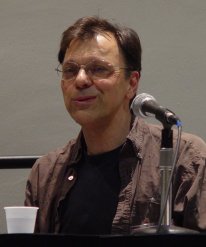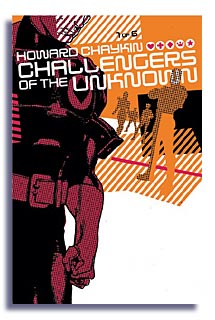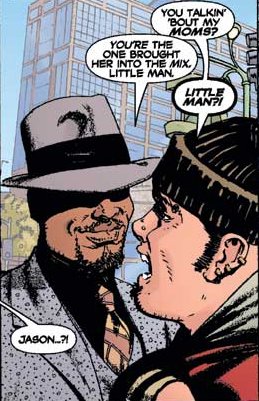|
Challenging
The Unknown
With A Master of the Form
An Interview with Howard Chaykin
|
|
|
Howard
Chaykin at Wondercon...
|
If
you don't know Howard Chaykin, it's because he's kept a low
profile in comics over the past few years. After spending
several years working on a variety of genre television shows
from The Flash to Mutant X, Chaykin recently announced that
he was coming back to the comics world full time. Sure, he'd
dabbled with a short story here and there, and still found
time to write a few series including American
Century for DC/Vertigo, but the comics world had gone
without his full attention for too long. First he did a 96-page
graphic novel for DC called Mighty
Love, and in just three weeks, we'll see his take on one
of DC's oldest properties, Challengers of the Unknown, a concept
near and dear to DC vice-president Dan DiDio's heart.
Still
don't know Howard Chaykin? As a young artist, he assisted
some of the greats of the Silver Age, including Gil Kane
and Neal Adams, whom he acknowledges as great influences
and great bosses. Going solo, Chaykin initially made a splash
among early fandom with trippy work on series like Cody
Starbuck and Ironwolf (vampires, tall ships and intergalactic
empires before they all became trendy). Readers at large
sat up and took notice when Chaykin was tapped to draw the
Marvel Comics' adaptation of a little movie called Star Wars. After ten issues, Chaykin moved on to more adult fare,
including Dominic Fortune for Marvel and a pioneering graphic
novel with Michael Moorcock called Swords of Heaven, Flowers
of Hell.
In
the early eighties, Chaykin set comics on their ear with
the ground-breaking American Flagg!, a series that didn't
just synthesize many of his themes into one cohesive work,
but also brought page design, lettering and space into the
overall effect of a book in a way that few had attempted.
He'll credit Walt Simonson for doing it before him, but
it was Chaykin that got the wide-spread notice, and deservedly
so. Above all, American Flagg! was an incredible story,
and more than a little prescient in its satirical targets.
(Dynamic Forces will be reprinting the series in hardcover
in the Fall of 2004.)
He
moved on to the metaphorically autobiographical Time2 and
Black
Kiss, a sealed bag series that introduced a few, ahem,
vampire kinks to an unsuspecting audience. In the mid-eighties,
DC tapped Chaykin to reinterpret the classic pulp hero The
Shadow for a modern audience, and after a successful
launch, Chaykin turned the reins over to an up and coming
young artist named Kyle Baker.
Before
Hollywood called him to write TV shows, Chaykin also breathed
new life into Blackhawk, returning occasionally to do the
odd cover and a memorable Elseworlds or two. Though much
of his material has made development execs salivate, including
a series for the late Malibu called Power & Glory, he
has yet to be tapped to adapt his own work for the screen.
But he's still interested...
At
WonderCon, I almost literally ran into Chaykin in the lobby,
and he took our near-collision with graciousness and good
humor. He invited me to his spotlight forum that night,
and we agreed to do an interview later in the week.
My
friends, this is a massive one. Minutes into our phone conversation
two weeks ago, Chaykin warned me that he liked to digress.
I didn't mind. I had a lot of audio tape, and Chaykin's
digressions were worth listening to.
So
fanboys and fangirls, Mr. Howard Chaykin...
Derek McCaw:How
did you get involved with the Challengers of the Unknown project?
Dan DiDio said it was one of his personal mandates to bring
back, but why you?
Howard Chaykin: You know, I don't
know. There you go. He called me. Actually, I think it might
have been over breakfast. Dan and I tend to discuss a lot
of business over food. I think it's because we're both fairly
good eaters, we behave nicely and we have good manners.
I've always felt that on a title level
alone, it's a great title. He asked if I'd be interested
in doing the development process on it. He made it explicit
to me that he wanted me to do for the Challengers what I'd
done for Blackhawk, for The Shadow and for other projects,
which is sort of re-inventing them for a contemporary audience.
I went back and read the material. And
I came to a conclusion that was based on a long-standing
and long-ranging dialogue that I've had with a number of
people in the film and television industry and the comic
book business, about the difference between period heroes
and contemporary heroes.
Beyond the obvious stuff, one of the really
major, less overt, differences is the presence of an agenda.
One of the things that I found is that it's an uphill sell
with characters and situations where you don't have a hero
and a worthy adversary. When the adversary is simply something
that the hero seeks out to find, problems, it becomes melodrama
at its core.
So I felt that it was imperative to come
up with an agenda for the Challengers of the Unknown. I
also felt that the characterizations of those original four
characters really existed in a kind of enclosed period universe.
Those jobs, those things those guys did, don't really have
a profound relevance in contemporary culture.
I reinvented those characters. They exist
in a way where we don't see them, but we do reference them.
They are referred to by a number of people, mostly the villains.
That's sort of what I'm talking about in
terms of an agenda. I've got a truly monstrous bad guy against
heroes who are not quite as monstrous but getting there.
DM: And you have this as a six-issue
mini-series?
Chaykin: The characters themselves
and the situation itself will be introduced in the six issues.
We end the six issues with the world in place, which leaves
it completely open for an ongoing series.
DM: Would you be willing to do
that series?
Chaykin: I've got a lot of other
commitments, but I'd love to write it.
DM: You mentioned Blackhawk and
The Shadow, both being series that you put a great stamp
on that both fizzled out after you left them.
Chaykin: I thought that the Blackhawk
stuff that Marty (Pasko) and Rick (Burchett) did was sensational.
I loved that stuff. I'm a huge fan of Rick Burchett and
a great fan of Marty Pasko. I thought they did a great job
on that Blackhawk in the fifties stuff; that CIA stuff was
dynamite.
I must be crazy. I thought it was swell.
The Shadow was odd, but it had some
funny moments. I thought what Kyle (Baker) did with Andy
(Helfer) was interesting, too.
The fact is that Challengers comes
out in June, June 16. And it introduces a kind of a hyper-paranoid
world-view which I think may not be true, but is very real.
If that makes any sense.
Or
vice versa, depending on how you look at it.
|
|
|
A moment
from The Unknown...
|
DM:
What attracts you to revamping long-standing properties
when what you're more known for is wildly original concepts?
Chaykin: I have to think that when
I've taken these old concepts and rebuilt them, I've turned
them into wildly original new concepts.
DM: One of the most interesting
remarks you made at WonderCon was that you're trying to
attract the older reader, rather than the younger reader
everybody else always talks about. Do you think that Challengers
of the Unknown fits that goal?
Chaykin: I don't really know.
The reason I made the remark, and obviously
it was semi-facetious, is that I tend to believe that the
younger reader doesn't read. There aren't a lot of readers
among the up and coming kids. Kids no longer read the way
that I did for entertainment, or you did. Videogames and
big-budget explosive movies have functionally replaced comics
as the entry level drug of entertainment.
I think it's more important to find, frankly,
new readers among people who read genre fiction. There was
an attempt to try it with science fiction, and there have
been a number of attempts to try it with detective fiction.
But in all those cases, I think it's been really conventional
approaches to the material.
There are ways to try to reach new audiences.
And a new audience isn't necessarily a kid. I'm older than
you, I guarantee it, but I still read hot-blooded adventure
fiction and thrillers. That's my meat.
DM: So what could the industry
be doing to attract those readers? You mentioned at Wondercon
that in Europe, they have no problem attracting them, with
older people reading graphic albums like Lt. Blueberry or
Moebius.
Chaykin: One of the things about
comic book conventions these days is that you're seeing
more and more wives with their husbands.
For Wondercon, for example, I made an arbitrary
decision that I would not do sketches for anybody but young
kids and women, just because I figured there wouldn't be
a lot of them. And I did a lot of sketches. Not a lot for
kids, because the kids didn't care. I don't do the X-Men.
But I had a lot of women coming over. I thought perhaps
they'd be a lot of wives and girlfriends, but there are
also just a lot of women.
I mean, that might be endemic to San Francisco,
per se. But in general, I did a lot more sketches than I
wanted to or planned to. (laughs)
Damn them! Damn them!
But that's a good thing. I came into the
comic book industry at a time just before women as a readership
were dismissed, when the love comics were thrown away. By
that time love comics had become a pale imitation of what
Simon and Kirby had intended them to be. But there was still
an acknowledgment of the female reader.
For example, Mighty Love had its
fruition in a conversation I was having with my wife, who
couldn't give a damn about comic books. She asked me why
there weren't any more love comics.
I explained to her, in a sort of Sermon
on the Mount way, that all comics are love comics. All these
books are soap operas.
But then I started thinking about it, going,
"wait a minute, there's lots of different kinds of love."
I mean, my favorite romantic films are screwball comedies.
And that's where Mighty Love got started.
DM: Yes, it reminded me a lot
of The Shop Around The Corner.
Chaykin: That's exactly right. A
man who actually knows the original reference. I mean, I've
heard it referred to as You've Got Mail with superheroes.
But I'm a guy who goes back.
Also She Loves Me, the musical comedy
version starring Daniel Massey and Barbara Cooke. So there
you go.
DM: Did it work? Did your wife
then enjoy Mighty Love?
Chaykin: She hasn't read it yet.
She's convinced that there's an encoding
to comic books that she can't grasp. One of the things that
you and I have to realize is that we live in a jargonate
culture. And there's a lot of normal people out there.
It's kind of like, and this is no affront
to my wife, we all hear stories about the Red Train in Russia
in 1917 and 18, that was traveling around the provinces
of Eastern Russia. It was showing movies of the Revolution,
and the peasants were totally freaked out by this clearly
ungodly process of movies.
My wife looks at a comic book and has no
idea where to look first. And we take it for granted. I
see where she's coming from.
DM: Scott McCloud wrote about
that in Understanding Comics, that some people just don't
know how to read them.
Chaykin: We've had so many fights
about this, though we've got better things to do with our
lives than fight about this shit.
But I've finally come to the conclusion
that there is an issue. And it's not her mental problem;
it's just that she doesn't understand the way we do the
sort of synergy that exists between pictures and words.
For example, this past weekend I signed
off on the final lettering and coloring of Challengers.
What I checked for were tangents and organization of space
used with the captions and the balloons. And I made one
very specific adjustment which my editor, in a semi-facetious
way, remarked that I must be really obsessive.
The
answer is yes. I am really obsessive. But I think it serves
the work in a way that demonstrates my interpretation of
depth of field and space. The balloons and captions are
all part of the picture. They are as important an element
as the panels and the page.
To
part two of Howard Chaykin...
|








